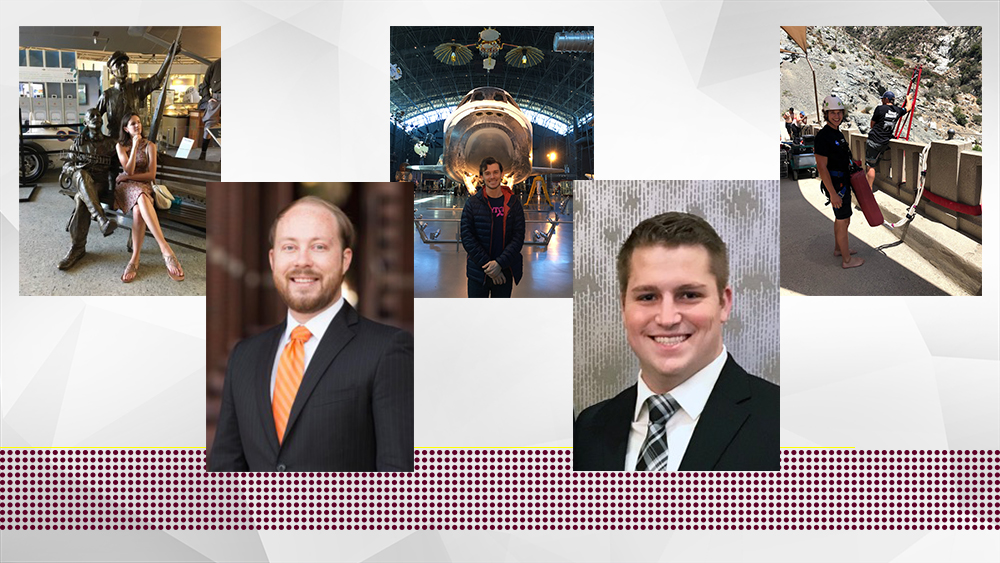
Five students from the Department of Aerospace Engineering at Texas A&M University have been awarded 2019 national graduate fellowships.
Christine Greve was awarded the National Defense Science and Engineering Graduate (NDSEG) Fellowship. She currently works at the Plasma Dynamics Modeling Laboratory. The goal of Greve’s NDSEG research proposal titled “Data-Driven Calibration Model of Hall Effect Thruster Dynamics,” is to improve predictive modeling capabilities for in-space electric propulsion (EP) systems. While physics-based models have been developed and used to investigate EP devices, validation of the simulation with experimental data could be time consuming. The research focuses on developing data-driven methods that employ experimental data to advance our understanding of the plasma flows, enabling more rapid development of new space propulsion technologies.
Greve worked as a summer intern at the Air Force Research Laboratory and received the American Institute of Aeronautics and Astronautics’ 20 Twenties award in 2018. During her bachelor’s studies at the University of Oklahoma, she worked three summers at the NASA Marshall Space Flight Center and was named an Astronaut Foundation Scholar in 2016. Greve is advised Dr. Kentaro Hara.
Logan Kunka was awarded the Department of Energy Computational Science Graduate Fellowship (CSGF). The fellowship includes four years of support (2018-2022) and summer practicum at a Department of Energy national lab. Kunka’s current research focus is on the numerical simulation of high-speed, reacting flows. Specifically, he is looking at the use of detonation waves for aerospace propulsion systems.
Kunka graduated from Oklahoma State University (OSU) in 2018 with degrees in both aerospace and mechanical engineering. While an undergraduate, he was extensively involved in undergraduate research at OSU and interned at the Sandia National Laboratory Combustion Research Facility, which sparked his interest in combustion simulation. Kunka began graduate studies at Texas A&M in the Fall of 2018. He is advised by Dr. Alexei Poludnenko.
Joseph Carlson was awarded the NDSEG. Carlson’s research focuses on hypersonic morphing control surfaces, utilizing a combination of hypersonic aerothermodynamic investigation, controls development and conceptual design to perform in-depth examinations of control surfaces for high-speed aerospace vehicles. A new understanding of the underlying physical mechanisms of curved control surfaces will lead to new control concepts that lower drag, reduce heat loads and increase performance. This work will be conducted at the National Aerothermochemistry and Hypersonics Laboratory. Carlson is co-advised by Dr. Rodney Bowersox and Dr. Nathan Tichenor.
Carl Leake was awarded the NASA Space Technology Research Fellowship (NSTRF). Leake is researching the n-dimensional k-vector and Theory of Connections. His fellowship proposal is titled "Improving the Fidelity of General Flexible Multibody Dynamic Simulations," and will focus on improving the ability to simulate flexible multibody structures. This simulation capability is a critical component in the design of a large variety of systems, including extraterrestrial rotorcraft systems. Leake is advised by Dr. Daniele Mortari.
Hunter Johnston was awarded the NSTRF. Johnston submitted the proposal “Real-time Optimal Guidance Via Theory of Connections.” With the next generation of space missions beyond Earth orbit, a new generation of algorithms must be developed to decrease the reliance on Earth-based navigation techniques. In fact, the ability to execute orbital maneuvers, rendezvous and landing procedures on board and in real time is of great importance for future missions. The focus of my research is to apply a technique called the Theory of Connections (which has been applied to solve differential equations) in order to develop a solution for real-time optimal landing. Johnston is advised by Mortari.